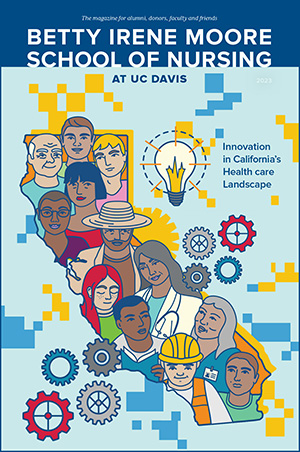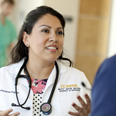
Recognizing alumni impact
As graduates of the Betty Irene Moore School of Nursing at UC Davis, you are part of a network of changemakers who break traditional boundaries, develop innovative partnerships and advance health. When you connect to something bigger than yourself, you are the change needed to transform health care. No matter its size, an It’s Bigger than Me moment can change the future. Sharing your moments connects you to our collective impact.
This National Nurses Week, May 6-12, we celebrate the impact of Betty Irene Moore School of Nursing at UC Davis nursing alumni by sharing your stories below.
“My share is end-of-life care for a 62-year-old forest ranger. She had aggressive cancer, moving quickly. The hospice nurses and I (as nurse practitioner) worked hard for days to get her comfortable. At the end, her friends who were her caregivers were able to laugh and share quiet moments of joy, surrounded by photos of a life full of friendship, travel, beauty and fun. This is one story of patient, caregiver family and team work I will always remember. We all did it together, and she was dearly loved.”
Leah Morris, M.S. leadership ’13, family nurse practitioner ‘13
“Having the opportunity to be part of a diverse leadership team was my Bigger than Me moment.”
At my third interview, after graduating from the Betty Irene Moore School of Nursing, I spoke with an interdisciplinary panel around a circular table that included members of the leadership team: the chief of quality, the chief of surgery, the director of the risk department, the clinical nurse director, a quality nurse consultant and an executive assistant. I was escorted into the conference room, nervous with sweaty palms and my heart was racing so loudly I thought everyone in the room could hear it. After everyone introduced themselves with their titles, I knew this was going to be a tough interview with a tough crowd.
What took me by surprise, however, was I was also inspired in this stressful moment. Looking back at me, as I answered change implementation questions for over an hour, were three women who had dark brown skin, another man and woman who were wearing rainbow pins on their name badges, and two men who had a lighter skin tones with accents I could not place. This was not the panel I have become accustomed to interviewing with — this was a diverse group. And as I heard the different perspectives at the table, I relaxed. I realized I not only had the education to be here, I also had a unique voice that was missing from the team.
We learned at the Betty Irene Moore School of Nursing the importance of having health care teams that reflect the community they are serving as a way to address not only the social determinants of health, but implicit bias and institutional racism. I realized I not only had the education to be here, I also had a unique voice that was missing from the team that would be valued. This was my Bigger than Me moment because this interview that led me to my current position on this team, allows me to bring unheard perspective to the decision makers of this facility.”
Carel Troutman, M.S. leadership ‘16
“As a student at the Betty Irene Moore School of Nursing, I was taught the value of breaking down workplace silos and facilitating interdisciplinary communication. So as a quality and safety nurse in perioperative services, when the wound care team came asking if our departments could work together to reduce the occurrence of patient injuries related to pressure and positioning and in the operating room (OR), I knew it would be a good thing for our patients and for our staff. The OR team taught the wound care team what they needed to know about patients in surgery and the wound care team taught the OR team what they needed to know about preventing pressure related injuries. Together, we accomplished our goals. Now, aspects of our collaboration model have been published and presented at several national conferences to reduce pressure injuries in the operating room and improve surgical patient outcomes, and that’s Bigger than Me.”
Suzanne Beshore, M.S. leadership ‘12
“In nursing school, with every patient there were always issues I could not address. I was effectively, competently treating health issues, but I did not want to treat. I wanted to solve. I wanted to heal. Public health nursing is where I finally found my place and realized, as a nurse, the difference I could make extended beyond the interventions I performed on my own. Maybe I can't heal every single person, but I can play a part in healing a broken system and that’s Bigger than Me.”
Victoria Conlu, M.S. leadership ‘17
“Seeing health care globally and understanding systems change were critical lessons I learned at UC Davis. With this knowledge I could work on a multidisciplinary team to help a mid-size hospital system recover and expand after facing termination from CMS and Joint Commission. Now, I help a local health plan expand services into other counties and ensure that primary care and behavioral health services are timely and appropriate across the entire network and that’s Bigger than Me.”
Kristen Tarrell, M.S. leadership ‘14
“I’m contributing to a larger body of evidence. In the beginning, I gathered data from previous nursing scientists, from previous physicians, from previous medical research. Without their contributions, I wouldn’t be able to see the direction that things needed to go. Now, I am part of that collective body of research and the next researcher can come in to make their contribution.
I think it’s so funny because sometimes I think I’m a big nerd. But really, there’s no substitute. It’s like an emotion. It’s kinda like love or like joy. You could put it to words to give people an idea of what it feels like; but, you can’t really tell people what it feels like. You just have to go through it.
My thesis topic was Allostatic Load and its Effects from the Black Woman’s Perspective and it’s Bigger than Me.”
John (JJ) B. James, M.S. leadership ‘17
“People see that I come from the Betty Irene Moore School of Nursing, and they want to work with me because I think they see that I can cross disciplines. They don't necessarily know at first that I'm not a nurse, but they see me as somebody who can connect. I'm now a professor of health sciences at CSUS. It's a teaching institution. It's a diverse student body. Many of our students are coming in wanting to be nurses.
My favorite part about mentoring students into nursing is helping them and empowering them with their own stories that traditionally or historically may have caused them a sense of fear or a sense of shame…like being undocumented, coming from a low-income family, bussing to richer part of town so they could pursue their education.
I get to tell my students, ‘Let me help you see your story again as something that is empowering.’ These are stories that they've kept, and for the first time, they get to use these stories as a sense of empowerment, and that’s Bigger than Me.”
Susan Perez, Ph.D. '14





